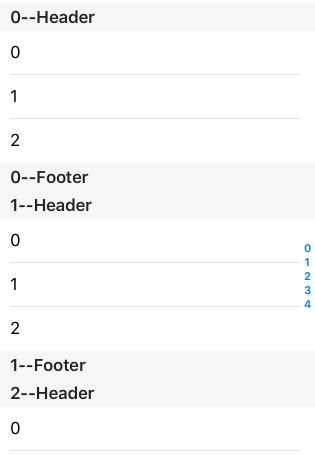swift中UITableView的简单使用
Posted hualuoshuijia
tags:
篇首语:本文由小常识网(cha138.com)小编为大家整理,主要介绍了swift中UITableView的简单使用相关的知识,希望对你有一定的参考价值。

import UIKit
/// TableViewDataSource展示
class YJTableViewDataSourceVC: UIViewController, UITableViewDataSource
/// 数据源
var data = [[Int]]()
/// UITableView
@IBOutlet weak var tableView: UITableView!
// MARK: - view
override func viewDidLoad()
super.viewDidLoad()
// 以组演示,填充相关测试数据
var section = [Int]()
for _ in 0..<5
section.removeAll()
for row in 0..<10
section.append(row)
self.data.append(section)
// MARK: - 开起和关闭tableView编辑状态
@IBAction func onClickEdit(_ sender: AnyObject)
self.tableView.setEditing(!self.tableView.isEditing, animated: true)
// MARK: - UITableViewDataSource
// MARK: 有几组
func numberOfSections(in tableView: UITableView) -> Int
print(#function)
return self.data.count
// MARK: 每一组有几个元素
func tableView(_ tableView: UITableView, numberOfRowsInSection section: Int) -> Int
print(#function)
return self.data[section].count
// MARK: 生成Cell
func tableView(_ tableView: UITableView, cellForRowAt indexPath: IndexPath) -> UITableViewCell
print(#function)
var cell = tableView.dequeueReusableCell(withIdentifier: "cell")
if cell == nil
cell = UITableViewCell(style: UITableViewCellStyle.default, reuseIdentifier: "cell")
cell?.textLabel?.text = "\\(self.data[indexPath.section][indexPath.row])"
return cell!
// MARK: 组Header
func tableView(_ tableView: UITableView, titleForHeaderInSection section: Int) -> String?
print(#function)
return "\\(section)--Header"
// MARK: 组Footer
func tableView(_ tableView: UITableView, titleForFooterInSection section: Int) -> String?
print(#function)
return "\\(section)--Footer"
// MARK: 索引
func sectionIndexTitles(for tableView: UITableView) -> [String]?
print(#function)
var sectionTitles = [String]()
for i in 0..<self.data.count
sectionTitles.append("\\(i)")
return sectionTitles
// MARK: 索引对应的组
func tableView(_ tableView: UITableView, sectionForSectionIndexTitle title: String, at index: Int) -> Int
print(#function)
return Int(title) ?? 0
// MARK: 能否编辑
func tableView(_ tableView: UITableView, canEditRowAt indexPath: IndexPath) -> Bool
print(#function)
return true
// MARK: 增加和删除
func tableView(_ tableView: UITableView, commit editingStyle: UITableViewCellEditingStyle, forRowAt indexPath: IndexPath)
print(#function)
if editingStyle == .delete
// Delete the row from the data source
self.data[indexPath.section].remove(at: indexPath.row)
tableView.deleteRows(at: [indexPath], with: .fade)
else if editingStyle == .insert
// Create a new instance of the appropriate class, insert it into the array, and add a new row to the table view
// MARK: 能否移动
func tableView(_ tableView: UITableView, canMoveRowAt indexPath: IndexPath) -> Bool
print(#function)
return true
// MARK: 移动cell
func tableView(_ tableView: UITableView, moveRowAt sourceIndexPath: IndexPath, to destinationIndexPath: IndexPath)
print(#function)
// 处理源数据
let sourceData = self.data[sourceIndexPath.section][sourceIndexPath.row]
self.data[sourceIndexPath.section].remove(at: sourceIndexPath.row)
self.data[destinationIndexPath.section].insert(sourceData, at: destinationIndexPath.row)
以上是关于swift中UITableView的简单使用的主要内容,如果未能解决你的问题,请参考以下文章